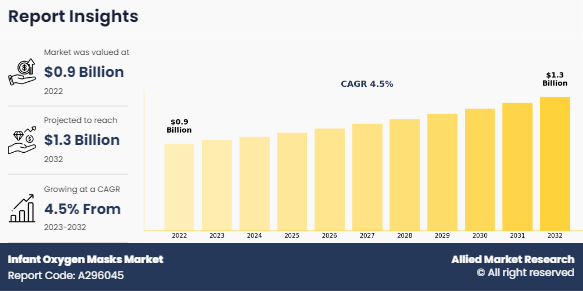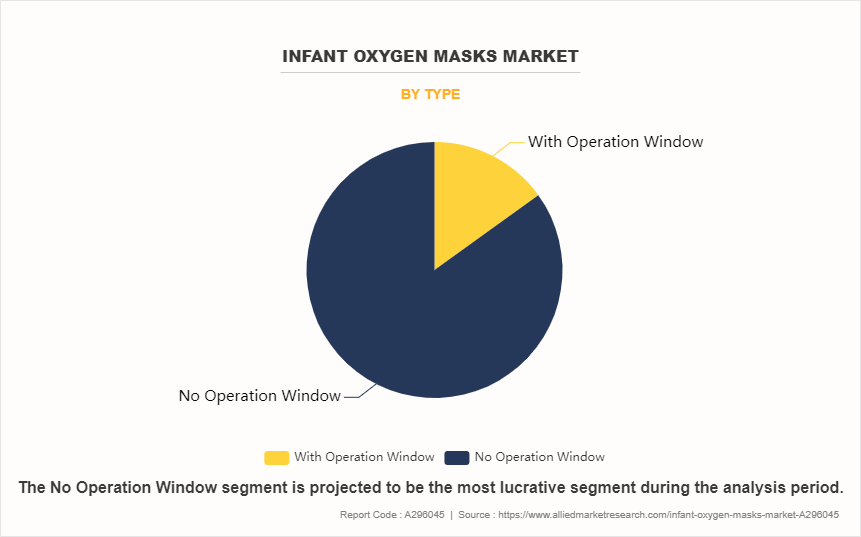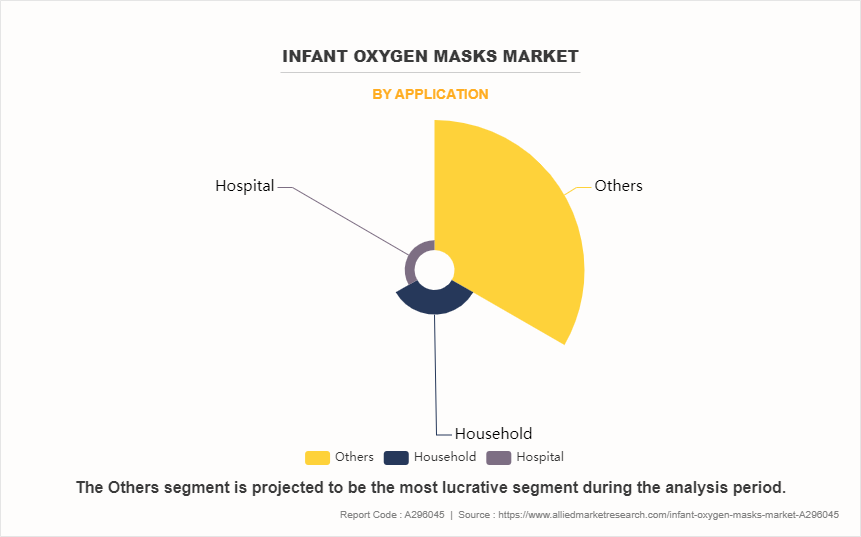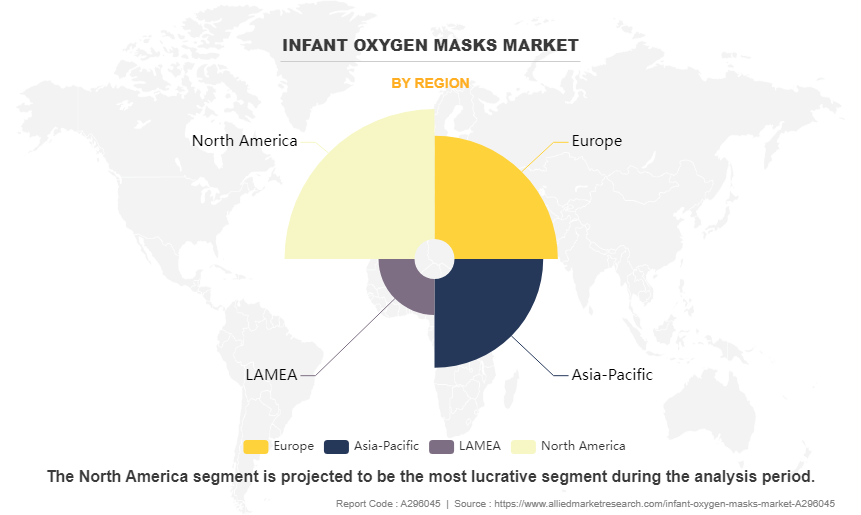Infant Oxygen Masks Market Research, 2032
The global infant oxygen masks market was valued at $854 million in 2022, and is projected to reach $1.3 billion by 2032, growing at a CAGR of 4.5% from 2023 to 2032. An infant oxygen mask is a medical device designed specifically for delivering supplemental oxygen to infants or newborns who require respiratory support. These masks are a crucial component in medical settings such as hospitals, clinics, and emergency situations where the administration of oxygen is necessary to support a child's respiratory function. It is typically made of soft, non-irritating materials to enhance comfort and reduce the risk of skin irritation. The mask is connected to an oxygen source, such as a portable oxygen cylinder or a hospital's central oxygen supply system.

The rising incidence of respiratory disorders in infants, such as respiratory distress syndrome (RDS), bronchopulmonary dysplasia (BPD), and other conditions, is expected to drive the demand for infant oxygen masks. RDS is a common respiratory disorder in premature infants, characterized by insufficient surfactant production in the lungs. Infant oxygen masks are often used to deliver supplemental oxygen to support respiratory function in these cases. Bronchopulmonary dysplasia (BPD) is a chronic lung disease that primarily affects premature infants who have received prolonged mechanical ventilation and oxygen therapy.
Infant oxygen masks are essential in managing and providing oxygen support to infants with BPD. Preterm infants are at a higher risk of respiratory complications due to underdeveloped lungs. The rising rates of preterm births contribute to an increased incidence of respiratory disorders, necessitating the use of oxygen masks for respiratory support. Respiratory infections, such as pneumonia and bronchiolitis, are common in infants. Furthermore, the drivers of the infant oxygen masks market are intertwined with the prevalence of respiratory disorders in infants, highlighting the importance of these devices in managing and treating respiratory conditions in the early stages of life.
The healthcare products, especially those designed for infants, are subject to strict regulations and standards imposed by health authorities such as the FDA (Food and Drug Administration) in the U.S. or the European Medicines Agency (EMA) in the European Union. Meeting these requirements demands meticulous attention to detail and compliance with specific manufacturing, safety, and quality standards. Obtaining regulatory approvals for infant oxygen masks involves a lengthy and time-consuming process.
Manufacturers are required to submit comprehensive documentation, conduct extensive testing, and comply with a series of regulatory reviews. Moreover, regulatory compliance is a critical aspect of the infant oxygen masks market, and manufacturers need to navigate a complex landscape to meet the necessary standards. While ensuring compliance is vital for patient safety, it also presents challenges in terms of time, costs, and ongoing adherence to evolving regulatory requirements.
Technological advancements in the healthcare industry, specifically in the design, materials, and features of infant oxygen masks, present several opportunities for manufacturers. Technological improvements can lead to the development of infant oxygen masks that are more comfortable for babies. Soft and hypoallergenic materials, as well as ergonomic designs, can contribute to increased patient comfort.
Advancements in design and materials can result in infant oxygen masks that provide a better fit and seal, ensuring optimal oxygen delivery. This can be crucial in maintaining the required oxygen concentration and minimizing the risk of leakage. Incorporating monitoring technologies into infant oxygen masks can allow healthcare professionals to track vital signs and oxygen saturation levels in real-time. This not only enhances patient care but also provides valuable data for medical professionals. Advanced technologies enable the customization of oxygen masks based on specific medical conditions or patient needs. This can lead to the development of specialized masks catering to various respiratory challenges in infant oxygen masks market size. This is particularly beneficial in emergency situations and during patient transfers.
The key players profiled in this report include Ningbo David Medical Device, Neokraft Medical, GINEVRI, GaleMed, Fanemx, DISON Instrument&Meter, Medline, SS Technomed, Plasti-med, Phoenix Medical, Neotech, and Natus Medical. Product innovation and development of infant oxygen mask are common strategies followed by major market players. For instance, in July 2021, for its line of portable oxygen concentrators known as X-PLO2RTM, Belluscura (BELL) announced the signing of its first contract and third distribution agreement with a producer of durable medical equipment.
Segments Overview
The infant oxygen masks market size is segmented on the basis of type, application, and region. By type, the market is classified into with operation window and no operation window . By application, the market is classified into household, hospital, and others. By region, the market is analyzed across North America, Europe, Asia-Pacific, and LAMEA.
By Type

The with operation window sub-segment is anticipated to grow at the fastest CAGR during the forecast period. Adherence to regulatory requirements and safety standards is a critical factor in the medical device industry. Infant oxygen masks must meet specific regulatory guidelines to ensure the safety of the patients, which can influence the with operation window segment. Infant oxygen masks market growth advancements in technology have led to the development of more efficient and user-friendly infant oxygen masks.
These innovations focus on improving comfort, fit, and oxygen delivery accuracy, which can drive market growth as healthcare providers seek better tools for patient care. The incidence of respiratory disorders among infants, such as respiratory distress syndrome (RDS), bronchopulmonary dysplasia (BPD), and pneumonia, is a significant driver for the demand for infant oxygen masks. These masks are crucial in delivering supplemental oxygen to infants with breathing difficulties. Different age groups or medical requirements might necessitate specific features or adjustments in the design of oxygen masks to ensure optimal performance and patient comfort.
Healthcare providers and medical device manufacturers increasingly prioritize enhancing the user experience for both caregivers and infants. Masks with intuitive operation windows, easy-to-adjust straps, and clear visibility of the infant's face ensure better usability and reduce the likelihood of errors during oxygen administration. Infant oxygen masks need to work seamlessly with various respiratory support systems and monitoring devices, ensuring compatibility across a range of medical settings. The materials used in the manufacturing of infant oxygen masks can impact their durability and performance.
By Application

The hospital sub-segment dominated the global infant oxygen masks market share in 2022. The rising incidence of respiratory disorders in newborns is a primary factor driving the demand for infant oxygen masks in hospitals. Premature births and other medical conditions can lead to respiratory issues in newborns, necessitating the use of oxygen therapy. The advancements in medical technology, especially in newborn care, contribute to the development of innovative infant oxygen masks. Hospitals often seek advanced and user-friendly equipment to enhance patient care, leading to the adoption of newer and more efficient oxygen masks. The rising number of NICU admissions in hospitals, driven by factors such as premature births and complications during delivery, creates a significant demand for infant oxygen masks.
Hospitals need to equip their NICUs with suitable respiratory support devices. Supportive healthcare policies and government initiatives aimed at improving neonatal care and reducing infant mortality rates are expected to drive the adoption of infant oxygen masks in hospitals. Financial incentives or regulatory measures may encourage hospitals to invest in quality respiratory care equipment. Hospitals with modern and well-equipped infrastructure are more likely to invest in advanced medical devices, including infant oxygen masks market opportunity.
By Region

By region, North America dominated the global infant oxygen masks market in 2022. The rising incidence of respiratory disorders among infants in North America is a significant factor driving the infant oxygen mask market growth. Conditions such as bronchiolitis, pneumonia, and respiratory distress syndrome necessitate the use of oxygen therapy, driving the demand for infant oxygen masks. With advancements in healthcare infrastructure and increasing investments in neonatal care facilities across the region, there is a higher availability of specialized medical equipment, including infant oxygen masks. This trend boosts the regional market growth as hospitals and clinics procure these masks to cater to the needs of newborns.
Countries with higher birth rates may experience an increase in demand for neonatal and infant healthcare products, including oxygen masks. Technological advancements in the design and functionality of infant oxygen masks are predicted to drive market growth as healthcare providers seek more effective and user-friendly solutions. Government policies and regulations related to healthcare standards and safety can impact the adoption and usage of medical devices, including infant oxygen masks. Improvements and investments in healthcare infrastructure, both in the public and private sectors, are anticipated to influence the accessibility and adoption of medical devices.
Key Benefits for Stakeholders
- This report provides a quantitative analysis of the market segments, current trends, estimations, and dynamics of the infant oxygen masks market analysis from 2022 to 2032 to identify the prevailing infant oxygen masks market opportunities.
- The infant oxygen masks industry research is offered along with information related to key drivers, restraints, and opportunities.
- Porter's five forces analysis highlights the potency of buyers and suppliers to enable stakeholders make profit-oriented business decisions and strengthen their supplier-buyer network.
- In-depth analysis of the infant oxygen masks industry segmentation assists to determine the prevailing market opportunities.
- Major countries in each region are mapped according to their revenue contribution to the global infant oxygen masks market forecast.
- Market player positioning facilitates benchmarking and provides a clear understanding of the present position of the market players.
- The report includes the analysis of the regional as well as global infant oxygen masks market trends, key players, market segments, application areas, and market growth strategies.
Infant Oxygen Masks Market Report Highlights
| Aspects | Details |
| Market Size By 2032 | USD 1.3 billion |
| Growth Rate | CAGR of 4.5% |
| Forecast period | 2022 - 2032 |
| Report Pages | 310 |
| By Type |
|
| By Application |
|
| By Region |
|
| Key Market Players | Neokraft Medical, Medline, Fanemx, SS Technomed, Plasti-med, Ningbo David Medical Device, B Braun, GINEVRI, GaleMed, DISON Instrument&Meter |
Rising awareness among healthcare professionals and parents about the importance of early detection and treatment of respiratory disorders in infants leads to an increased diagnosis rate. This, in turn, boosts the demand for respiratory care devices, including infant oxygen masks, in hospital settings.
The major growth strategies adopted by the infant oxygen masks market players are development of infant oxygen masks and product innovation.
Asia-Pacific will provide more business opportunities for the global infant oxygen masks market in the future.
Ningbo David Medical Device, Neokraft Medical, GINEVRI, GaleMed, Fanemx, DISON Instrument&Meter, Medline, SS Technomed, Plasti-med, Phoenix Medical, Neotech, and Natus Medical are the major players in the infant oxygen masks market.
The with operation window infant oxygen masks sub-segment of the type segment acquired the maximum share of the global infant oxygen masks market in 2022.
Hospitals and clinics are the major customers in the global infant oxygen masks market.
The report provides an extensive qualitative and quantitative analysis of the current trends and future estimations of the global infant oxygen masks market from 2022 to 2032 to determine the prevailing opportunities.
Increasing incidence of respiratory disorders in infants, such as respiratory distress syndrome (RDS), bronchopulmonary dysplasia (BPD), and pneumonia, drives the demand for infant oxygen masks in hospitals. These masks are crucial in delivering supplemental oxygen to infants with compromised respiratory function.
Growing awareness among healthcare providers about the importance of respiratory support for infants and the availability of advanced oxygen delivery systems to drive the global infant oxygen masks market.
Loading Table Of Content...
Loading Research Methodology...



